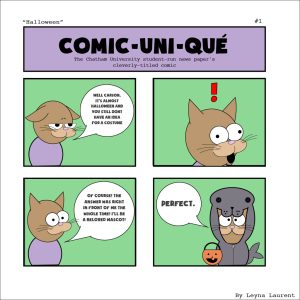Chatham Board of Trustees decision on Sanger Hall shows the power of student spirit
February 19, 2020
The Chatham University Board of Trustees voted Feb. 14 to act on the Sanger Hall decision. The members resolved to treat the naming controversy as an educational opportunity. The bust of Margaret Sanger — the founder of Planned Parenthood and a supporter of eugenics — will be removed from the entryway and the lecture hall will be referred to as C-134 in course listings and location references for student meetings and events.
Furthermore, text indicating the positive and negative areas of Sanger’s work will be displayed at the lecture hall to indicate how it aligns with and rejects Chatham’s core values. This decision comes after years of debate regarding the questionable nature of Sanger’s presence on campus, given her history as both the founder of modern birth control and as a known eugenicist. The board’s choice may not satiate the full desire of students offended by Sanger’s history, but Chatham’s willingness to respond to student opinion demands attention.
How did the University reach these changes? Through ceaseless pushing and discussion.
Chatham’s student culture is one rich in diversity, acceptance and freedom of expression. Naturally, the nature of Sanger’s work offends much of the student body as she believed in the extirpation of disenfranchised people. Plus, the notion that Chatham received money from a non-profit foundation (the Colcom Foundation) that not only believed in Sanger’s cause but also supported President Donald Trump’s immigration policies was more than a tough pill for many on campus to swallow.
The extraordinary part of the Sanger Hall story, however, is the unification with which the students – across organizations, including Chatham Student Government and Black Student Union, as well as individuals – rallied around the issue. It was a topic of immense discussion on campus. Without the interest and grievance of the student body, it’s arguable that Chatham never would have acknowledged the error in its ways.
The attitude of relentless attention and problem solving exhibited by the student body must remain present in the minds of the entire Chatham community. Student voices thrive in the face of universities, which sometimes can feel more like businesses instead of schools, financial opportunities rather than foundations for our futures. It takes bravery to stand up to such a monolith as a lone student, but the combination of hundreds of voices aids in that struggle.
Students who advocated for the complete scrubbing of Sanger’s name from the University would do well to keep and tend to their activist flame. A University’s choice does not invalidate students’ voices — voices that should be used across all impassioned issues concerning students’ life and values as members of the Chatham community.
Should any student feel marginalized following the Sanger Hall decision or alone in their pursuits for their own sense of justice within Chatham University, there are ample organizations on campus aimed at garnering student activism and involvement. Chatham Student Government has a direct hand in the proceedings of Chatham’s day-to-day life and drafted a bill regarding Sanger Hall. Chatham Student Power dedicates its work to social activism in and outside of campus grounds. Even Chatham’s student newspaper The Communiqué provides its readers with insight into all levels of the University, from student life to the president’s office.
If students continue to express their opinions and come together in the pursuit of inclusivity, Chatham will only change for the bigger and the better. Sanger Hall’s development is just one chapter in this story.
Timeline of events surrounding the Sanger Hall controversy
• An organization called Colcom donated $30,000 to Chatham in 1999 to name the lecture hall after Sanger.
• Three years ago, students brought up her controversial past.
• In 2016, there was a forum between the Black Student Union, Chatham Student Government, Women’s Institute, an expert on Margaret Sanger and any other members of the Chatham community who wished to attend.
• The idea to change the name was proposed in 2017.
• Last spring, the Chatham Committee on Recognition and Memorials (CCRM) was formed to better address this issue. It met multiple times during the summer.
• Rachel Rossi ‘21 was hired during summer 2019 to work under Dr. Lou Martin doing research on Sanger and her controversial work.
• During the summer, the class gift of 2018 was added in the form of a mural honoring impactful women from history in the entryway to Sanger Hall.
• Chatham Student Government (CSG) held a meeting Sept. 12, 2019 for Dr. Finegold to present a history of Sanger Hall and the controversy surrounding it, along with possible solutions.
• A CCRM held a meeting Monday Sept. 16 so the committee could vote on a decision that will be made into a proposal and presented to the Board of Trustees.
• Multiple student organizations signed the bill in support.
• The Communiqué published a story Jan. 22 on Colcom and Chatham’s discussions on Sanger Hall.
• The Board of Trustees voted Feb. 14 to rename the hall on unofficial documents, remove the bust and treat this experience as a learning opportunity.
• These changes are projected to go into place the week of Feb. 17.






